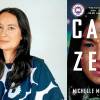Author TJ Alexander’s newest novel, “Chef’s Choice,” explores how a fake dating arrangement turned into real love. Luna, a proud transgender woman, gets laid off from her grating office job and is in need of quick cash. Jean-Pierre, a French transgender man, is in line to inherit the family empire from his celebrity chef grandfather — but only if he meets some strict requirements, including having a girlfriend and acing a culinary test. Together, Jean-Pierre and Luna form a mutually beneficial arrangement, but Luna and Jean-Pierre’s feelings for each other sizzle when this relationship of convenience heats up.
The book is Alexander’s second, the first being “Chef’s Kiss.” Originally from Florida and now based in New York, they received their master's degree in writing and publishing from Emerson College.
Alexander spoke with GBH News about the novel, which came out May 30, and why it's important for them to write queer love stories. Excerpts from the interview are below, and you can hear the full interview above.
Haley Lerner: Where did the idea for “Chef’s Choice” come from?
TJ Alexander: When I was writing “Chef's Kiss,” which is the first book in the series and my debut novel, I could tell that Luna, who is a side character in that story, was bringing a lot of main character energy to the page when she was appearing. And I really loved her and I wanted to just spend more time with her.
And then I just kind of built this book around that idea. Who do I get to pair her up with? And what kind of shenanigans can she get into? So that's how the fake dating foodie empire rom-com came to be.
Lerner: You write in your acknowledgments that this book celebrates the love that exists between transgender people. In a time where transgender people are facing extreme violence and discrimination, why do you think it was important to you to tell a love story between two transgender people and give this story to readers?
Alexander: I thought not just for readers, but for myself. You know, I'm a trans nonbinary person. I'm married to a trans woman. And I don't see relationships like ours represented a lot in media, or at all.
When I was thinking of who should Luna end up with, and who should be the love of her life that she gets to go on this adventure with, the idea of her being paired with a trans man was immediately appealing to me. As soon as I thought of it, I was like, “Oh, that makes just perfect sense,” because it's what I needed to see celebrated and shown how sweet and tender and also funny and weird a relationship like theirs can be.
Lerner: This book goes into a lot of the intricacies and issues that trans people face in their daily lives, some that are often affected by class. Can you talk about the intersectional nature of the transgender experience that you included in your book?
Alexander: I wanted to show how a trans person's life might look like if they had a fictional amount of wealth. Luna is a working-class gal who loses her job at the start of the book. And Jean-Pierre is a ridiculously, ludicrously wealthy man, which I decided to do because I thought it would be fun. They say money doesn't solve your problems, but for trans people, money would solve a lot of our problems, because many of our problems have to do with barriers that money could handle. When it comes to paying for surgeries or doctor's appointments, getting our legal paperwork together or representation for things like that, money is the big barrier to a lot of these things in America.
So there is a kind of tension between Luna and Jean-Pierre in that their experiences have been very different, not just because she's a trans woman and he's a trans man, but because he's been experiencing life as a trans person in a very different way than she has, with a lot fewer barriers.
Lerner: Oftentimes, stories of transgender people in the media are often tragic and don't have happy endings. Why was it important to you to tell a story that's joyful and romantic?
Alexander: I think growing up, any time I saw trans people portrayed in movies or TV — it was, first of all, rare — and it was either that they were the butt of a bad joke or they were this tragic figure where horrible things happened to them. They don't survive 'til the end because how can they survive in a world that is so harsh towards them?
And I find that really sad way of looking at transgender people's lives. Yeah, we do have a ton of struggles, especially right now, but we also have a ton of joys and we're also cooking dinner and baking cakes and falling in love and living our lives. I think that the more stories we have about trans people generally is a good thing.
Lerner: Overall, what do you hope people get out of this book?
Alexander: I hope that trans readers have a good time. We all need a good time, but especially trans folks right now. I hope they find a little bit of joy and comfort and fun in reading it.
There might be readers that have never thought about two trans people dating or what that might look like, it might feel very strange to them at first. And I hope that this book kind of shows them that there's no reason to think that it's strange or odd. It's actually a very fun and funny story. And you're allowed to enjoy it, too.








